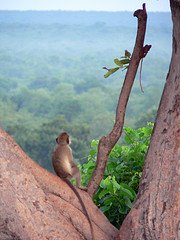One year ago I wrote about a study that linked trauma during childhood to increased risk for certain diseases later in life. The study in question was done in humans and I compared that research paradigm with the cruel experiments done on animals to imitate child abuse and neglect.
By comparison, other perhaps less creative and certainly less compassionate people try to create animal "models" of child abuse and neglect by subjecting baby animals to maternal deprivation or by purposefully taking healthy babies and putting them with aggressive adults. If the baby animals used in these terrible experiments survive, they suffer from a range of physical and psychological pathologies, conditions that are rarely acknowledged or treated. The outcome has many similarities to post-traumatic stress disorder.
Studies that explicitly examine post-traumatic symptoms in elephants, chimpanzees and other animals only serve to bolster this claim.
Revisit the original story to read more about the trauma-disease link.
Trauma in early life, disease in later life
Read More...
Collapse...
The online edition of USA Today (12/26) includes a letter to the editor about chimpanzees that I submitted earlier this month: Experiments Extreme
They accept reader comments (with login) and the Maven always welcomes ratings / social bookmarks.
[end of post]
Read More...
Collapse...
A recent study done in Japan has shown that chimpanzees outperform college students on certain cognitive tests. In response to broad news coverage of this story, I wrote an opinion piece (here titled "How chimps are treated is not smart"), which juxtaposes the bright minds of our great ape cousins with the mistreatment and suffering endured by those imprisoned in US labs.
Read More...
Collapse...
I stumbled across this photo today quite by accident. And I thought, "Look at all of it." You just have to see it.

photo by stig nygaard
A mind that evolved in such and expansive and complex environment is undoubtedly ill-equipped for this:

A word that meant the opposite of expansive couldn't even begin to describe it. Inimical. Cruel.
Read More...
Collapse...
I was deeply saddened by the recent news of the death of Washoe, a chimpanzee who lived at the Chimpanzee Human Communication Institute in Ellensburg, WA for many years. Her passing is cause to reflect and inspiration for an op-ed (Here with the header "Legacy for Washoe") that I wrote about Washoe last week.
Some people writing about her death have claimed that she changed what it meant to be human – that she changed our society. That, I suppose, is true – but there is more to that lesson. Washoe also helped us see what it means to be chimpanzee. When she spoke her mind, signing about her wants and needs, playing jokes or tricks, showing empathy, she embodied a message of compassion – one that we have not fully heard.
Her life "spoke" of chimpanzee-hood, humanity and compassion. Not in the figurative way that Kafka envisioned when he wrote of Red Peter. But literally - when she joked, fibbed, comiserated, threw tantrums - she challenged us all to think differently (bigger?) about the minds of nonhuman animals. She will be missed.
In light of the lessons taught by Washoe, her fellow signing apes, and all that we know about chimpanzees, we must now realize that how we currently keep and treat chimpanzees in U.S. laboratories is replete with ethical problems. It's time for the United States to join nations all over the world, from Austria to Liberia and New Zealand, that have banned experiments on chimpanzees. It is the right and compassionate thing to do. I'm sure that Washoe would have signed that she agreed.
For more information, see the tribute site, CHCI, Friends of Washoe.
Read More...
Collapse...



